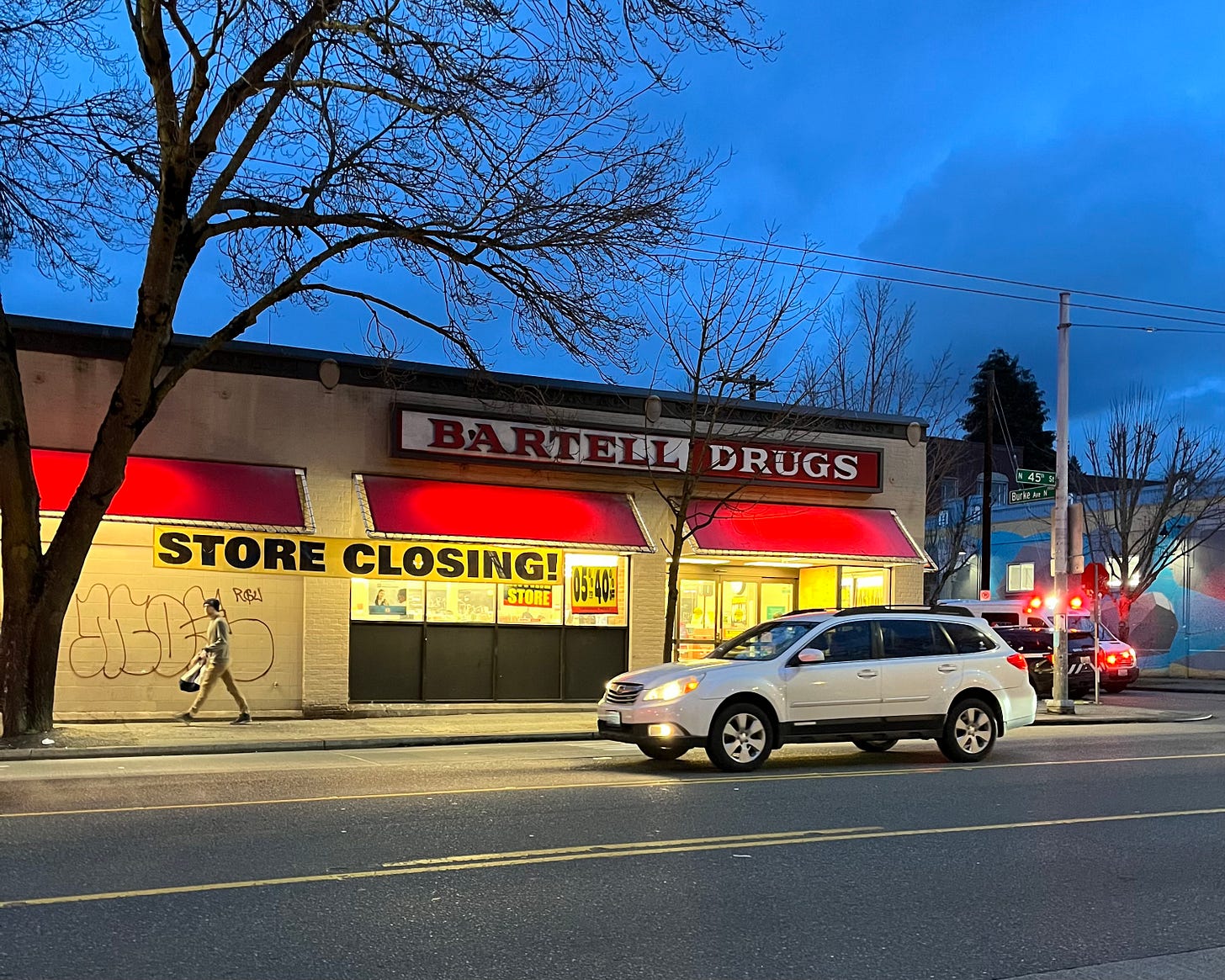Is *anyone* happy with our health care system?
It's the most expensive in the world—but even for-profit companies aren't happy. This week, it cost CVS CEO Karen Lynch her job.
About a year ago, for what would become my last story for Fortune, I started reporting on the death of the American pharmacy.
It was a bleak, national story that’s also a hyper-local one. I wound up focusing on the slow demise of Bartell’s, a beloved Seattle mini-chain now owned by Rite Aid, and the plights facing smaller and independent pharmacies across the nation. But, as I wrote in June, many of the same problems are facing the big drugstore chains, too.
For months, I’ve been thinking about how one Seattle pharmacist eulogized his industry to me:
“Pharmacies are in shambles. It’s unbelievable what’s happening right now,” says Abdikadir Athur, a pharmacist who spent six years at Bartell’s and then Rite Aid before cofounding a small pharmacy, Tukwila Station, in the Seattle suburb of SeaTac.
He adds: “If even big chains cannot survive—and even CVS and Walgreens are hurting—what do you expect for the small pharmacies?”
This week underlined just how much CVS and Walgreens—not to mention our entire health care system—are, indeed, hurting.
On Tuesday, Walgreens announced that it would close another 1200 of its drugstores over the next three years, since a quarter of them aren’t making money. (My NPR colleague Alina Selyukh dove into the specific ailments at Walgreens and CVS pharmacies, here.)
Then, on Friday, CVS abruptly said it had replaced CEO Karen Lynch, after less than four years. (Shades of Roz Brewer!) Lynch spent her relatively brief tenure—and nearly $20 billion on medical businesses—trying to make CVS even bigger and more in control of Americans’ health care.
“It’s like the renaissance of health care right now,” Lynch told me last year, in the middle of making those expensive deals. “Now we’re all connected together.”
But CVS’s investors, and its board, seem to have grown unhappy about the costs of all of that connectivity. The company is still making lots of money—more than $8 billion in profit last year—but it’s been making less money than it originally predicted, and less than investors expect. CVS shares have fallen about 25 percent this year (including a plunge on Friday after the company announced Lynch’s departure).
CVS’s operations—and its woes—extend far beyond its drugstores. It’s the sixth-largest company in the country, with some $358 billion in sales last year. CVS owns Aetna, which insures nearly 40 million people, and Caremark, one of the powerful and controversial “pharmacy benefit managers” that control how most U.S. prescriptions are processed.
But being involved in so many operations means that problems in any or all of them can hurt the overall company. Which is a spreading discontent among the investors making money from the biggest health care businesses.
Take the health care conglomerate UnitedHealth Group. It’s less of a household name than CVS or Walgreens, but it’s even bigger and more powerful: UnitedHealth is the largest U.S. health insurer; the owner of the Optum pharmacy benefits manager; and—with some 90,000 affiliated physicians, or 10% of all U.S. physicians—the nation’s largest employer of doctors.
UnitedHealth is also the fourth-largest company in the country, with $371 billion in annual revenue. And, as my Fortune colleague Erika Fry and I wrote last year, it has long been the business juggernaut that CVS and other Big Health Care companies have aspired to become.
And yet. This week, UnitedHealth also disappointed its investors, by saying that it would make less money than expected next year. Yes, the company and its owners will be fine—UnitedHealth has still made $9 billion in profit so far this year—but its shares still plunged.
So, in a week when even the biggest for-profit companies seem unhappy with the current state of health care, it’s worth asking: Is our health care system working well for anyone?
It’s not working for we the patients, or the “consumers.” The United States has the most expensive health care system in the developed world, with an average cost of $13,500 per year per capita. (And, as has been amply documented, that expense doesn’t even guarantee good care: We also have some of the worst health outcomes among our peers.)
This system isn’t working for our employers, who sponsor health care plans for more than 154 million people … and who “are shelling out the equivalent of buying an economy car for every worker every year to pay for family coverage,” according to KFF.
It’s certainly not working for doctors and pharmacists and other health care providers, who are fleeing the industry.
Right now it doesn’t even seem to be working very well for the big, profitable conglomerates who have built up this system; for the executives who have staked their careers on trying to make it even bigger; or, at least this week, for the investors who are still making a lot of money off of the whole thing.
In other words, to paraphrase Seattle’s Abdi Athur: If even the big companies—and their owners—are struggling, what do you expect for the rest of us?




